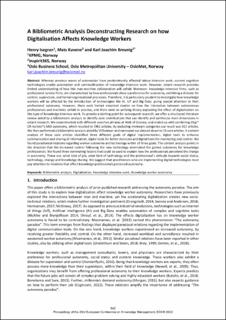| dc.contributor.author | Isegran, Henry | |
| dc.contributor.author | Kuvene, Mats | |
| dc.contributor.author | Breunig, Karl Joachim | |
| dc.date.accessioned | 2023-03-06T13:25:19Z | |
| dc.date.available | 2023-03-06T13:25:19Z | |
| dc.date.created | 2022-09-05T16:01:12Z | |
| dc.date.issued | 2022 | |
| dc.identifier.citation | Proceedings of the European Conference on Knowledge Management. 2022, 23 (1), 542-551. | en_US |
| dc.identifier.isbn | 978-1-914587-45-0 | |
| dc.identifier.isbn | 978-1-914587-44-3 | |
| dc.identifier.issn | 2048-8971 | |
| dc.identifier.issn | 2048-8963 | |
| dc.identifier.uri | https://hdl.handle.net/11250/3056094 | |
| dc.description.abstract | Whereas previous waves of automation have predominantly affected labour intensive work, current cognitive technologies enable automation and commoditization of knowledge intensive work. However, extant research provides limited understanding of how this man-machine collaboration will unfold. Moreover, knowledge intensive firms, such as professional service firms, are characterized by how professionals show a preference for autonomy, exhibiting a distaste for control, supervision, and formal organizational processes. Therefore, it is particularly prudent to investigate how knowledge workers will be affected by the introduction of technologies like AI, IoT and Big Data, giving special attention to their professional autonomy. However, there exist limited empirical studies on how the interaction between autonomous professionals and machines unfold in practice, and there exist no unifying theory explaining the effect of digitalization on this type of knowledge intensive work. To provide a starting point for subsequent research, we offer a structured literature review aided by a bibliometric analysis to identify core contributions that can identify and synthesize main dimensions in extant research. We experimented with different searches phrases at Web of Science, and ended up with combining (Digi* OR techno*) AND autonomy, which resulted in 3961 articles. By excluding irrelevant categories our result was 815 articles. We then performed a bibliometric analysis aided by VOSviewer and narrowed our dataset down to 15 core articles. A content analysis of these core articles identified three different goals of digital implementation; digital tools to enhance communication and sharing of information, digital tools for better decisions and digital tools for monitoring and control. We found paradoxical relations regarding worker autonomy and technology within all three goals. The content analysis points in the direction that the increased control following the new technology dominated the gained autonomy for knowledge professionals. We found three dominating factors that could be used to explain how the professionals perceived the change in autonomy. These are; what kind of job, what kind of technology and the professional’s attitude towards social status, technology, change and knowledge sharing. We suggest that practitioners who are implementing digital technologies must pay attention to relations that affect knowledge professionals perceived autonomy. | en_US |
| dc.language.iso | eng | en_US |
| dc.publisher | Academic Conferences International Limited | en_US |
| dc.relation.ispartofseries | Proceedings of the European Conference on Knowledge Management;Vol. 23 No. 1 (2022) | |
| dc.rights | Attribution-NonCommercial-NoDerivatives 4.0 Internasjonal | * |
| dc.rights.uri | http://creativecommons.org/licenses/by-nc-nd/4.0/deed.no | * |
| dc.title | A bibliometric analysis deconstructing research on how digitalisation affects knowledge workers | en_US |
| dc.type | Peer reviewed | en_US |
| dc.type | Journal article | en_US |
| dc.description.version | publishedVersion | en_US |
| dc.rights.holder | (c) 2022 European Conference on Knowledge Management | en_US |
| cristin.ispublished | true | |
| cristin.fulltext | original | |
| cristin.qualitycode | 1 | |
| dc.identifier.doi | https://doi.org/10.34190/eckm.23.1.395 | |
| dc.identifier.cristin | 2048990 | |
| dc.source.journal | Proceedings of the European Conference on Knowledge Management | en_US |
| dc.source.volume | 23 | en_US |
| dc.source.issue | 1 | en_US |
| dc.source.pagenumber | 542-551 | en_US |

